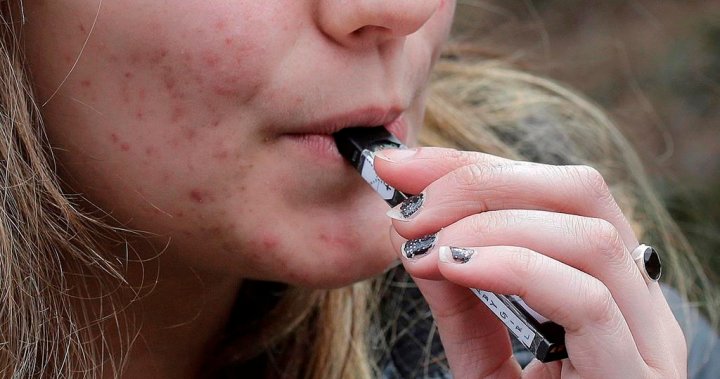E-cigarette products, or vapes, may contain toxic metals that are particularly harmful to children and teens, a new study has found.
The study, published Monday in the Tobacco Control journal, says vaping may increase the risk of exposure to lead, uranium and cadmium. Ingesting metals causes systemic harm to young people following not only long-term use, but short-term as well, it warns.
“An increased overall metal exposure burden has been linked to cognitive impairment, behavioural disturbances, respiratory complications, cancer, and cardiovascular diseases in children,” the study says.
Exposure to lead is associated with significant effects on cardiovascular and neurocognitive functions, it says, while cadmium exposure is linked with an increased risk of osteoporosis and cancer in the nasopharynx, lung, breast, pancreas, prostate and bladder.
The findings come as countries across the world continue to struggle with vaping’s popularity among young people, which has skyrocketed in the past five years.
In Canada, rates of smoking tobacco have been steadily declining since the early 2000s, but vape-use has spiked in return.
Statistics Canada data from January found approximately one in seven youth aged 15 to 19 reported vaping in the past month in 2022. One in 15 said they vaped every day.

A 2021 Canadian Tobacco and Nicotine Survey (CTNS) found 61 per cent of youth who vaped in the past 30 days said they had never tried a tobacco cigarette.
The latest health and medical news
emailed to you every Sunday.
However, 30 per cent of youth aged 15 to 19 and nearly half of young adults aged 20 to 24 said they tried vaping in their lifetime.
The Tobacco Control study analyzed urine samples from 200 teens aged 13 to 17 in the United States from December 2018 to November 2019. Eighty-one of the 200 participants were “frequent” vape users, meaning they ingested 27 puffs a day. Forty-five participants were intermittent users (7.9 puffs) and 65 reported occasional use (0.9).
Greater frequency of vape use was associated with higher levels of lead and uranium in urine, the study says. Intermittent and frequent users both had higher levels than occasional users.
E-cigarette users who opted for sweet flavours had higher levels of uranium in their urine than those who smoked mint or menthol flavours.
The study notes that while previous research has found a link between e-cigarette consumption and toxic metals, the findings “vary significantly by brand and type of vapouriser used” which may not be “entirely representative of typical use conditions.”
“Nonetheless, these compounds are known to cause harm in humans,” the study says.
The most common reasons youth aged 13 to 19 reported vaping in the CTNS study were to reduce stress, because they enjoyed it, curiosity, and a desire to fit in with their peers.
In 2021, the federal government announced it would ban most vape flavours and reformulate existing flavours with ingredients approved by Health Canada. Though these regulations haven’t come to fruition yet, flavoured vapes have already been banned in five provinces and territories: Quebec, New Brunswick, P.E.I., Nova Scotia and the Northwest Territories.

Ontario announced Sunday that it is banning vaping devices in schools, along with cannabis, nicotine and tobacco products.
The provincial government said it’s devoting $30 million in its 2024 budget toward installing vape detectors and other security upgrades in schools.
Dr. Kieran Moore, the province’s chief medical officer of health, said the move will help protect students from “preventable threats.”
Canada’s mental health and addictions minister, Ya’ara Saks, is supportive of Ontario’s measures.
“Vapes have no place in the hands of youth and certainly not in school. We applaud any steps that further these objectives,” Saks told Global News in an email Tuesday.
Saks said the federal government continues to work on restricting vape-related advertising country-wide. It is also investigating ways to limit vape flavours, nicotine content and online availability.
“Regulations prohibit the promotion and advertising of vaping products anywhere they can be seen or heard by youth and set a maximum nicotine concentration for vaping products,” she said.
“We will take all steps necessary to protect young Canadians.”
© 2024 Global News, a division of Corus Entertainment Inc.





